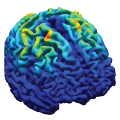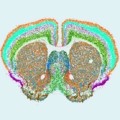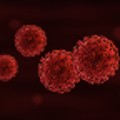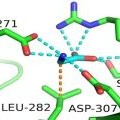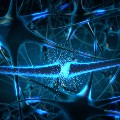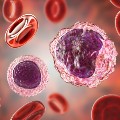Science Updates from 2023
- Magnetic Seizure Therapy as Effective as Electroconvulsive Therapy for Treating Depression
-
This clinical trial found that MST is equally effective at reducing depression symptoms as ECT, but with fewer side effects.
- Scientists Unveil Complete Cell Map of a Whole Mammalian Brain
-
For the first time ever, an international team of researchers has created a complete cell atlas of a whole mammalian brain.
- The Ups and Downs of Bipolar Disorder
-
• 75th Anniversary
Josh Santana shares his story of growing up with ADHD and bipolar disorder.
- Life Beyond Anorexia Nervosa
-
• 75th Anniversary
An in-depth look at Kristina Saffran's journey with Anorexia Nervosa.
- High School Students Invited to Reflect on Mental Health Stigma in National Essay Contest
-
The National Institutes of Health is inviting high school students ages 16-18 to participate in an essay contest on the topic of mental health stigma.
- NIMH Creates Division of Data Science and Technology
-
On October 23, the National Institute of Mental Health (NIMH) announced the creation of a new Division of Data Science and Technology (DST).
- Saving Lives Through the Science of Suicide Prevention
-
• 75th Anniversary
Evidence-based efforts to improve suicide risk screening, assessment, and intervention are helping to save lives, thanks to research supported by NIMH.
- Emergency Department Intervention Reduces Adult Suicide Risk
-
Evidence-based practices for suicide prevention effectively reduced suicidal behaviors among adults seen for care in emergency departments.
- Cracking the Ketamine Code
-
• 75th Anniversary
NIMH supported science and NIMH researchers helped pave the way for the development of ketamine—a groundbreaking treatment that has improved the lives of those who are impacted by treatment-resistant depression.
- Helping People With Serious Mental Illness Quit Smoking
-
In a study funded by the National Institute of Mental Health and published in JAMA Psychiatry, Gail Daumit, M.D., of Johns Hopkins University, A. Eden Evins, M.D., of Massachusetts General Hospital and Harvard Medical School, and colleagues developed a tobacco smoking cessation intervention for people with serious mental illness.
- Scientists Unveil Detailed Cell Maps of the Human Brain and the Nonhuman Primate Brain
-
A group of international scientists have mapped the genetic, cellular, and structural makeup of the human brain and the nonhuman primate brain, allowing for a deeper knowledge of the cellular basis of brain function and dysfunction, helping pave the way for a new generation of precision therapeutics for people with mental disorders and other disorders of the brain.
- NIH Launches Community-Led Research Program to Advance Health Equity
-
NIH is funding a first-of-its-kind community-led research program to study ways to address the underlying structural factors within communities that affect health, such as access to safe spaces, healthy food, employment opportunities, transportation, and quality health care.
- Combined, High Maternal Stress and Prenatal COVID-19 Infection May Affect Attention Span in Infants
-
Prenatal COVID-19 infection increased the risk for impaired attention and delayed socioemotional and cognitive functioning among infants of mothers who experienced high psychosocial stress during their pregnancy.
- RAISE-ing the Standard of Care for Schizophrenia: The Rapid Adoption of Coordinated Specialty Care in the United States
-
• 75th Anniversary
The Recovery After an Initial Schizophrenia Episode research initiative, launched by NIMH to test the effectiveness of coordinated specialty care to treat first-episode psychosis, has transformed the mental health landscape in the United States and helped thousands of people with schizophrenia achieve better outcomes.
- Dr. Patricia A. Areán Named New Director of NIMH’s Division of Services and Intervention Research
-
Patricia A. Areán, Ph.D., has been selected as the new director of the National Institute of Mental Health’s (NIMH) Division of Services and Intervention Research (DSIR).
- Dr. Lisa Bowleg Named James S. Jackson Memorial Award Winner
-
The National Institute of Mental Health (NIMH) has named applied Social Psychologist Lisa Bowleg, Ph.D., M.A., the 2023 James S. Jackson Memorial Award winner.
- Blocking HIV Enzyme Reduces Infectivity and Slows Viral Rebound
-
In this NIMH-funded study, researchers developed a compound that blocked an enzyme critical for forming HIV particles, which stopped the virus from correctly forming and becoming infectious.
- Youth Emergency Department Visits for Mental Health Increased During Pandemic
-
Hospital visits for urgent mental health care increased among children and teens in the second year of the COVID-19 pandemic, according to an NIMH-supported study.
- Researchers Solve the Puzzle of a Brain Receptor’s Activation
-
Researchers in a NIMH-supported study identified a new receptor for glycine that helps enhance communication between nerve cells in the brain and offers a potential new target for treating mental disorders.
- Mothers' Difficult Childhoods Impact Their Children’s Mental Health
-
In this NIMH-funded study, researchers examined how trauma gets passed from one generation to the next.
- Newly Discovered Brain Connection Affects Reward Behavior in Mice
-
NIMH-funded research sheds light on how negative early life experiences may impact how we act in response to rewards, which is often disrupted in people with mental illnesses.
- Researchers Find Order in the Language of the Brain
-
New research supported by NIMH used mathematical approaches to explain how neurons in the brain communicate over time to support information processing.
- Youth Suicide Rates Increased During the COVID-19 Pandemic
-
In one of the first studies to examine national youth suicide rates during the COVID-19 pandemic, researchers showed that the pandemic increased youth suicide rates and the impact varied by sex, age, and race and ethnicity.
- NIMH’s Dr. Susan Daniels Designated National Autism Coordinator
-
Susan A. Daniels, Ph.D. has been appointed as the HHS National Autism Coordinator and Director of the Office of National Autism Coordination (ONAC).
- Population Study Finds Depression Is Different Before, During, and After Pregnancy
-
New NIMH-funded research tracked population-level rates of postpartum depression among new mothers before, during, and after pregnancy.
- Infants’ Health Record Data May Improve Early Autism Screening
-
Research supported by NIMH suggests that children’s health records may yield some promising insights that could improve the accuracy of early autism screening.
- Chatbot Encourages People With Eating Disorders to Seek Care
-
In a new NIMH-funded study, Ellen Fitzsimmons-Craft, Ph.D., an associate professor of psychiatry at Washington University School of Medicine, and colleagues developed a chatbot to encourage people with eating disorders to connect with care.
- Researchers Unlock Genetic Mutations Contributing to Disorders in the Brain
-
Researchers identified novel genes with mosaic mutations contributing to treatment-resistant pediatric epilepsy and pointing to specific disrupted pathways in cortical development.
- HIV Can Persist for Years in Myeloid Cells of People on Antiretroviral Therapy
-
A subset of white blood cells, known as myeloid cells, can harbor HIV in people who have been virally suppressed for years on antiretroviral therapy, according to findings from a small study supported by the National Institutes of Health.
- Medicaid Data Show Wide Differences in Mental Health Care in the United States
-
A new NIMH-supported study revealed differences in rates of mental health care among Medicaid enrollees based on where they live in the United States.
- New NIH Study Reveals Shared Genetic Markers Underlying Substance Use Disorders
-
Analyzing genomic data from more than 1 million people, researchers have identified genes that are commonly inherited across substance use disorders, regardless of the substance being used.
- Breaking Down Barriers to HIV Medication Access
-
Researchers investigated whether home delivery of ART for a modest fee could help improve ART access and use, finding it resulted in increased viral suppression in participants compared with clinic-based medication distribution.
- Long-acting antiretroviral therapy suppresses HIV among people with unstable housing, mental illnesses, substance use disorder
-
A long-acting antiretroviral treatment given every four to eight weeks, and delivered with comprehensive support services, suppressed HIV in people who were previously not virologically suppressed.
- Attention to Geometric Images May Offer Biomarker for Some Toddlers with Autism
-
An NIMH-supported study shows that preference for geometric images may be robust enough to serve as a biomarker for identifying some young children with autism.
- NIMH Researcher Karen Berman Elected as AAAS Fellow
-
Karen Berman, M.D., a senior investigator at the National Institute of Mental Health (NIMH), has been elected as a 2022 American Association for the Advancement of Science (AAAS) Fellow.
- COVID-19 Pandemic Associated With Worse Mental Health and Accelerated Brain Development in Adolescents
-
An NIMH-supported study suggests that adolescents living through the COVID-19 pandemic may be experiencing more anxiety and depression symptoms and accelerated brain aging.
- Brief Cognitive Training May Extend the Antidepressant Effects of Ketamine
-
An NIMH-supported study suggests that a brief self-association training program can extend the effects of a single ketamine infusion by shifting people’s negative self-beliefs.
- NIMH Creates Publicly Accessible Resource With Data From Healthy Volunteers
-
The NIMH Healthy Research Volunteer Study aims to build a comprehensive, publicly accessible resource with a range of brain and behavioral data from healthy volunteers.
